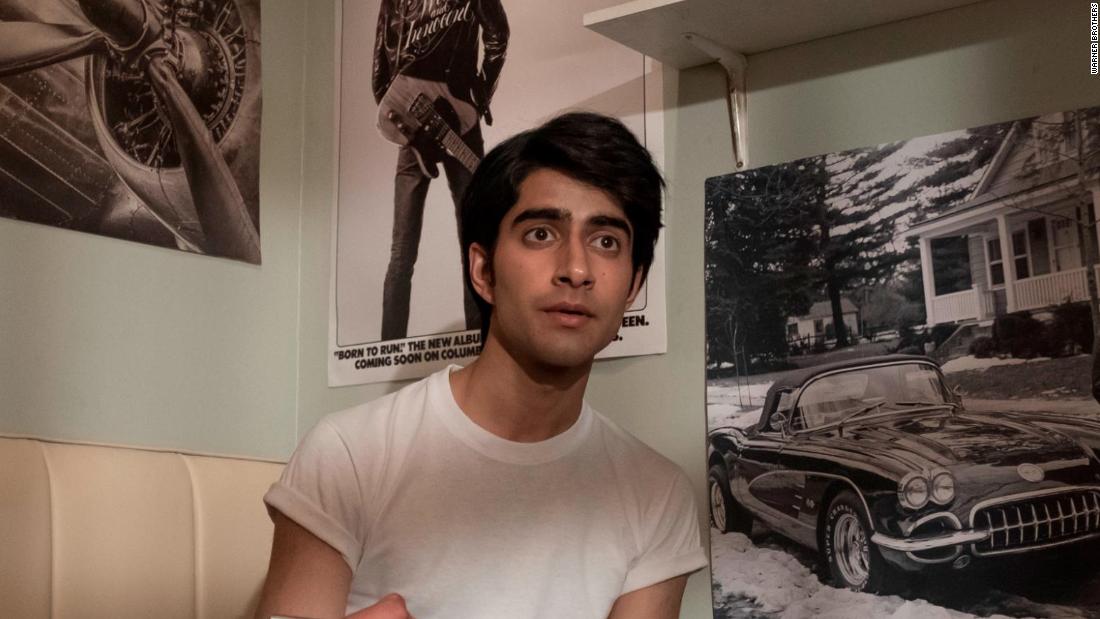[ad_1]
I watched it unfold and began to sob. Not at the racism, as awful as it was, but seeing myself in a teen who turned a blind eye to all his parents endured in pursuit of happiness. As the film’s eponymous song goes: “Mama always told me not to look into the sights of the sun. Oh, but mama, that’s where the fun is.”
It’s not surprising that Gurinder Chadha’s film evokes such recognition among my generation, born to post-World War II immigrants, now reaching middle age and raising children of our own. It joins a growing genre of Asian-American movies with old world-new world tensions at their heart: “The Farewell,” “Meet the Patels,” “Crazy Rich Asians,” “Always Be My Maybe” and Chadha’s own sleeper, “Bend it Like Beckham.”
“Blinded by the Light” tells the story of Javed, the son of Pakistani immigrants — his mother works as a seamstress and his father loses his job in an auto factory. Javed turns to poetry to both capture and escape his 1987 suburban British existence; his hometown of Luton, he writes, “is a four-letter word.”
It is a Sikh classmate who hands Javed a cassette tape of Bruce Springsteen. Javed gets hooked, as if the Boss — a continent and several cultures away — uniquely understands his pain. He becomes obsessed with lyrics about class struggle and identity, so far from the expectations of Pakistani and British society. And through this a portrait of the hardscrabble American dream emerges, along with Javed’s yearning to be a part of it.
We know the feeling of being trapped in the middle
In 1988, a year after the setting of this movie, I moved to Springsteen’s native New Jersey. The state is a frequent muse and backdrop to his songs, and rightfully so. My parents emigrated from India to the US in the early 1970s and I have lived all over — Puerto Rico, New Delhi, New York City, Los Angeles, Washington, D.C.
I can attest to the fact that New Jersey is the most American place on earth.
We know this feeling of being in the middle, trapped as translators. After January 2018, when President Trump referred to some immigrant homelands as “shithole countries,” I desperately tried to shield my parents from the news. My kids, too. The cursing was secondary to my deeper fears that they would no longer feel they had transcended one home, or fully belonged in another.
I forgot how Papa knows better, has seen more.
“There will always be those people. But they are the minority in America,” he told my daughters. “You have to believe that.”
He’s not naive. He was never beaten up like Javed’s dad, but his name’s been shortened, his accent mocked and his otherness scorned by co-workers. Our parents arrived at a time where these comments and beliefs were common. They combated these prejudices through hard work and by keeping their heads down.
In the film, Javed’s father advises his son do the same. Study economics, not writing, he says. To which Javed screams, “I don’t want to be your son! I want to be more than that!”
Indeed, our generation had high hopes. While my own schooling in the 1990s was filled with schoolyard taunts, it also forced and inspired change. English classes introduced us to Toni Morrison and Zora Neale Hurston, Gabriel Garcia Marquez and Amy Tan. School textbooks were revised to use terms such as Native American, to mention that George Washington owned slaves. In social studies, I had to memorize the five pillars of Islam.
The 1980s were tense and uncertain, for sure, but we kept hope alive, in echoes and applications of the civil rights movement. Our parents kept their heads down — so we didn’t have to.
Now we wonder each morning which America will greet us
I wonder if I want them to intervene if they see others being victimized or just keep their heads down.
Today, we ready ourselves in the morning for work and school, and we wonder which America will greet us. In the ultimate irony, fear and uncertainty also propel some Trump voters.
There’s irony in a Pakistani teen longing to escape racism in Britain for an idealized America that may not exist anymore. But Springsteen reminds us that there’s always been a gap between the inclusive American ideal and the harsher, complicated reality.
“Tell your stories. But don’t forget ours,” Javed’s father tells him. He’s right.
This movie does that. It offers what feels so unattainable right now — a representation where a laid-off Trump supporter and a left-leaning union guy and a teenage child of immigrants all might see themselves. They might find common ground in that most Springsteen of ideas — being “born to run” — and settle on the idea of a country that has room for all of them.
This ragtag medley of people who feel they don’t belong, who escaped and demand greatness from this land, is actually what makes America great. I must believe this.
Because my parents, they ran. Me, I have nowhere to go.
[ad_2]
Source link



